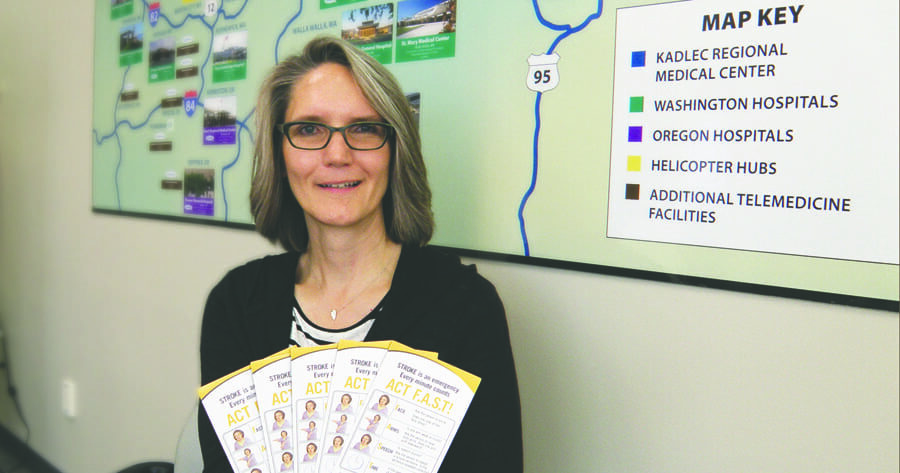
Home » Stroke experts, survivor encourage better awareness about symptoms, treatment
Stroke experts, survivor encourage better awareness about symptoms, treatment

November 15, 2017
Danene Scribner wants other stroke survivors to know there’s life after a stroke.
She visits with stroke patients once a week at Kadlec Regional Medical Center in Richland and encourages them to join a monthly stroke support group.
[blockquote quote="You can still do the things you love; you just do them in a different way." source="Danene Scribner" align="right" max_width="300px"]
“They are survivors, not victims. It just helps me in my journey and I want to help other people in their journey as well,” she said.
Scribner, as well as a nurse, doctor and emergency responder, spoke about the importance of recognizing symptoms of a stroke and why getting treatment quickly is critical during a news conference Oct. 30 at Kadlec.
Strokes are the fourth leading cause of death in the United States, killing more than 133,000 people each year and a leading cause of long-term adult disability, according to the National Stroke Association.
Scribner, 49, of Pasco, doesn’t fit the stereotype of a stroke survivor: she’s not a frail, aging senior citizen.
She suffered a stroke while running a 10K race in 2011, three weeks before she turned 43.
“I could really tell that something was wrong. … I got to the halfway point … and started walking, which wasn’t normal for me — fatigue. And I tried to start running again and it really wasn’t working out. My breathing was strange and I started kind of stumbling along and I couldn’t really walk a straight line, let alone run. I had to sit down,” she said.
She spent three weeks in the hospital and did outpatient rehabilitation for 12 weeks with speech, occupational and physical therapy.
She had to re-learn how to swallow, use her vocal chords and walk.
“I have this driving force in me. I wanted to get back to running. I wanted to get back to playing basketball. I wanted to get back to bicycling,” she said.
She said her body isn’t the same after the stroke as she’s had to adjust to “the new normal.”
“You can still do the things you love; you just do them in a different way or not to the same level. You still have that same involvement,” she said.
It helps her to reach out to others facing similar challenges, she said.
“You don’t have to be alone,” she said.
She also wants to raise more awareness about strokes.
“They can happen at any age. Be aware of your health,” she said.
Abby Richardson, a registered nurse who is Kadlec’s stroke coordinator, said the health system provided 187 stroke consultations so far this year, surpassing last year’s 156 consults, via the hospital system’s telestroke network. The two-way video bedside station allows neurologists with an expertise in strokes to assess patients in real time, 24 hours a day.
Richardson said the hospital treated 357 stroke patients from July 2016 to July 2017. Nationwide, someone experiences a stroke every 40 seconds, she said.
Richardson said strokes are highly preventable and some risk factors can be controlled, including high blood pressure, smoking, cholesterol levels, weight and diet.
Dr. Sara Atwal, a stroke-trained neurologist at Kadlec, said strokes are best treated when diagnosed quickly. She said it’s important to be aware of the symptoms, which include face drooping, weakness or numbness, slurred speech, vertigo or confusion.
Stein Karspeck of the Richland Fire Department said “not to hesitate to call 911” to get help for a possible stroke. “Time is brain tissue,” he said.
Kadlec’s stroke support group meets at 3 p.m on the third Tuesday of each month at the Kadlec Healthplex, 1268 Lee St. in Richland.
For more information, call 509-946-4611, ext. 4627.
Local News
KEYWORDS november 2017





